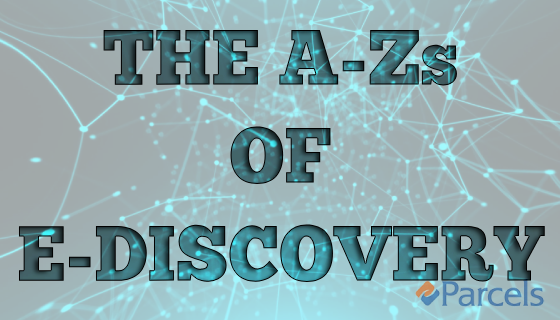
e-Discovery news is everywhere, and when you read it, it can sometimes feel like information overload from all the industry specific jargon and acronyms. What good is reading information if you don’t understand what’s being said? We wanted to take you through the most common terminology from A to Z used in the eDiscovery world in this series of blog posts.

Early Case Assessment (ECA): This includes a variety of tools or methods for investigating and quickly learning about ESI (see below) and other potential evidence to estimate risks, costs, and time associated with pursuing a particular legal course of action. Every case is unique; therefore, every ECA is dependent upon the nature of the case and resources are available.
e-Disclosure: When referring to the disclosure process in civil litigation, e-Disclosure involves making known whether an electronic document exists, has existed, and if you will allow your opponent(s) to have access to it.
Electronic Discovery: AKA, e-discovery or digital discovery (and what this blog series is about). This is the process of discovery in civil litigation, where electronically stored information (ESI — see below) is identified, collected, prepared, reviewed, and produced for litigation purposes.
Electronically Stored Information (ESI): According to the Federal Rules of Civil Procedure (FRCP), it is information designed, manipulated, stored, and best utilized in digital form, requiring the use of computer hardware and software.
Email Threading: Ya know how you open an email from someone, and you can easily find other messages within that conversation? This is email threading. It’s the organization of emails into conversational threads. This assists by increasing the review speed of email data. Not only does keeping email threads organized and on topic make them easy to read & understand, but it is also beneficial to the eDiscovery process! Sure, emails can be a hassle, but next time you start a new email chain, think about what it was like when every email was separated, individualized, and lost in your inbox, never to be found again…

Filtering: Filtering makes everyone’s lives so much easier. It’s the process of using certain parameters to remove documents and/or data that does not fit in order to reduce the volume of the data set. Similar to online shopping, you may remove and/or select specific size metrics, qualities, and attributes that will meet your needs in order to give you the most optimal options to choose from.
Forensics: The recovery, authentication, and investigation of material found in digital devices, so the information can be used appropriately as evidence in a court of law. Have you ever seen Bones, the TV show? Well, it’s kind of like what they do, but it’s with data instead of bones!
FRCP: An acronym for Federal Rules of Civil Procedure which governs eDiscovery and other elements of federal civil litigation. Most state courts have their own rules and regulations, though they are generally based upon elements of the FRCP.

Graphic Interchange File: Also known as .gif, is the second most commonly used image storage format on the web after .jpeg. You know those animated graphic files that last about 2-6 seconds? Typically used on social media to display your brand voice or individual personality, GIFs can be a great edition to digital marketing practices! Also, it’s pronounced with a hard “g” — it’s definitely not a “jif.”

Harvesting: Farmers harvest crops. e-Discovery specialists harvest ESI. It is the method of gathering electronic data for use in a future investigation or lawsuit, preferably while maintaining file and system metadata.
Hashing: To generate a hash. A hash is a unique alphanumeric value, such as 51FRC3B6DCDC1B8797AE5A, and it can be associated with a specific computer file, file group, or, in some cases, an entire hard drive.
Hosting: Hosting is a service offered by a third party litigation support firm (like Parcels). This provides cloud-based access to documents relating to a particular matter within a review software platform that can be accessed by logging in. Hosting through third parties gives you and/or your company more physical space and security resources to store crucial information that you may not have the ability to store and maintain on your own.

Image (Drive): This is the act of creating an identical copy of the drive as a whole, which includes any remaining space it may have. This is also called the “mirror image.”
Image (File): Instead of copying the drive, you’re copying the document. These images are usually in .tiff or .pdf format.

JPEG: We know this as an image file type, but did you know it actually stands for Joint Photographic Expert Group? Most images that we see on social media, send through email, and/or send over text are in .jpeg format.
Judgmental Sample: Judgment sampling is a method of sampling where a sampling group is selected based on the researcher’s judgment. This group of people usually possess some kind of knowledge, trait, or characteristic that the researcher is interested in. Judgmental sampling, or authoritative sampling, is typically done when the researcher decides that other sampling methods will take too much time, or if they prefer the results to be accurate with a low chance of the data becoming skewed.

Keyword: Keywords are everywhere. A keyword is a word that indicates the content of a document and is used in information retrieval. For example, a keyword in reference to this blog series would be “eDiscovery” or “litigation” because they allow you to find the information you are looking for more easily.
Keyword Search: This is a process of examining electronic documents (native format, searchable .pdf, or associated with an optical character recognition (OCR) text file) in a collection/system by matching or stemming a set of keywords with instances in different documents. This is done more frequently than you think. Have you ever Control+F’d (or Command+F’d) something?

Legacy Data: Think old. This is data that is hard to access or process due to an obsolete format or system. For example, floppy disks are not very common anymore, and the majority of computers nowadays don’t have a slot for them either. Therefore, it would take a great deal of work to get the information off of it. (And, just in case you forgot what a floppy disk is, here ya go.)
Legal Hold: Legal holds, also called “preservation orders,” are the temporary interruption(s) of a company’s document retention & destruction policies for data that might be relevant to a lawsuit or that is seen as significant. In our blog post, “eDiscovery 101: The Basics of Electronic Discovery,” we discuss why you might receive a legal hold in the collection and preservation process.
Linear Review: The process of having a legal team set eyes on every document one after another during a review. Many times, these documents are ordered by date or keyword preference. At Parcels, we offer expedited discovery services where we will work with your timeline and scope to fulfill all your review needs.
Load File: A load file can be used for several different things. It can be used to import data, it can be used as a file that links images together, and it can carry out software commands. These files, according to Wikipedia, are usually American Standard Code for Information Interchange (ASCII) files.
Chew on this next chunk of eDiscovery terms for a while. Use them in your conversations or in your writing. Need to catch up? Part one is here. Ready to move forward? Here’s part three: The A to Z’s of eDiscovery: M-T.
< Return to News